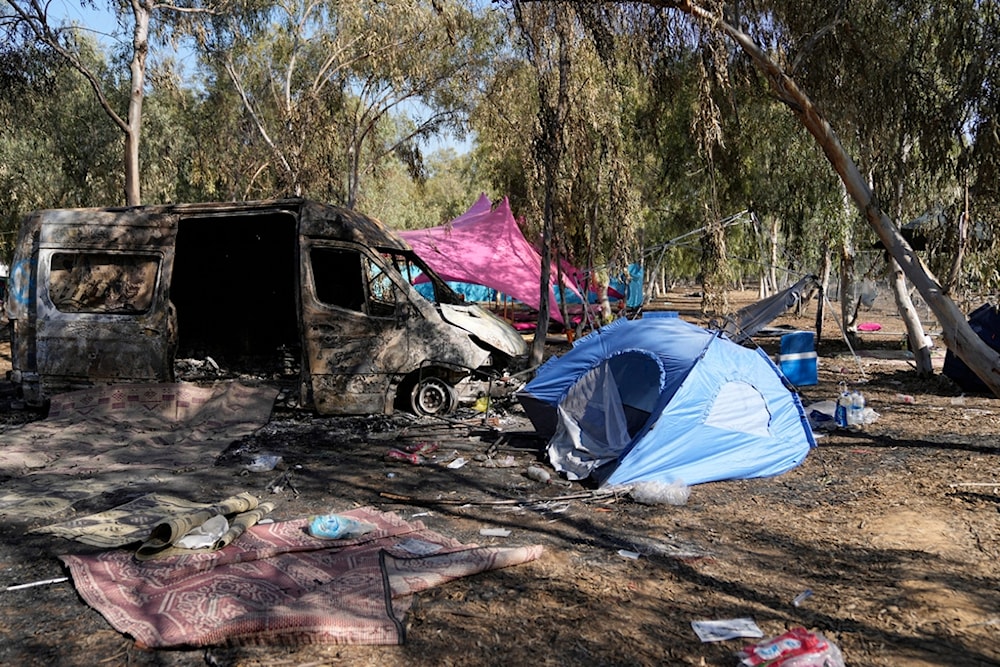'It's not true': 'Be'eri' kibbutz spox on sexual abuse claims on Oct.7
The rejection by spokesperson Michal Paikin undermines even more the NYT's credibility of its article: “‘Screams Without Words’: How Hamas Weaponized Sexual Violence on Oct. 7."
-

The site of a music festival near the border with the Gaza Strip in southern occupied Palestine, on Thursday, Oct. 12, 2023 (AP)
Allegations of rape specifically referred to by The New York Times in December, claiming rape by the Palestinian Resistance on October 7, were shut down by the spokesperson for the Kibbutz "Be’eri" identified as the location of the attack.
Two out of the three victims mentioned in NYT's marquee exposé, which alleged that Hamas had deliberately weaponized sexual violence during the October 7 attacks, were not, in fact, victims of sexual assault, according to the Kibbutz's spokesperson.
The rejection by spokesperson Michal Paikin undermines even more the NYT's credibility of its article: “‘Screams Without Words’: How Hamas Weaponized Sexual Violence on Oct. 7," in which it described the recounts of three alleged victims of sexual assault for whom it gave specific biographical information.
Two of three women have been said to not be victims.
One of them, dubbed “woman in the black dress,” was Gal Abdush, whose family contested the NYT claims, while the two others were unnamed sisters from Kibbutz "Be’eri" whose exact ages were given, which facilitated the process of locating them.
One day following the publication of the report, the Israeli news site Ynet interviewed Gal's parents. They emphasized the absence of evidence supporting the claim that she was raped, asserting that the newspaper's reporters had interviewed them under false pretenses. The parents stated that they were unaware of the sexual assault issue until the article in the American daily was published. Additionally, Gal's sisters vehemently refuted the allegations of rape.
Data from "Israel's" public list of the victims who died at the location that day, as well as a memorial page established by the community itself, helped The Intercept in matching the description in the NYT article: sisters Y. and N. Sharabi, ages 13 and 16.
Read next: Food blogger, Israeli film director scripted Hamas rape story for NYT
When asked about the NYT claims, the spokesperson said their name without any hinting: “You’re talking about the Sharabi girls?,” she said, adding, “No, they just — they were shot. I’m saying ‘just', but they were shot and were not subjected to sexual abuse.”
The spokesperson discredited the very intricate and graphic details of the Israeli paramedic who was noted as the source for the allegations, not only in the NYT story but also in The Washington Post, CNN, and other media outlets.
“It’s not true,” she told The Intercept. “They were not sexually abused.”
Despite the rejection of such narration, NYT spokesperson Danielle Rhoades Ha insisted on going along with the rape narrative.
“We stand by the story and are continuing to report on the issue of sexual violence on Oct. 7," she told The Intercept.
Last month, Israeli newspaper Haaretz reported that the Israeli police are finding paramount difficulty locating and finding any Israeli settlers who were victims of sexual assaults or witnesses of such acts allegedly committed by the Palestinian Resistance during the October 7 Operation Al-Aqsa Flood.
According to Haaretz, one of the main outlets propagating the claim that the Palestinian Resistance fighters sexually assaulted Israeli women on October 7, the police cannot find any victims or any witnesses of any form of sexual assault.
"Even in the few cases in which the [police] collected testimony about sexual offenses committed on October 7, it failed to connect the acts with the victims who were harmed by them," it said.

 4 Min Read
4 Min Read








